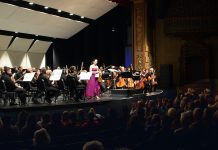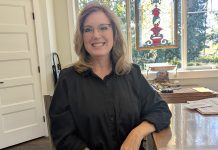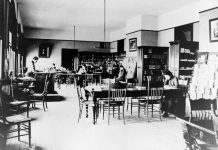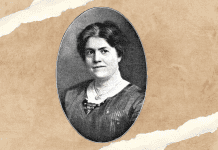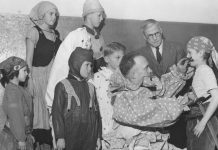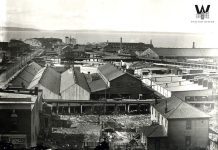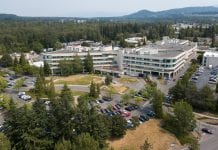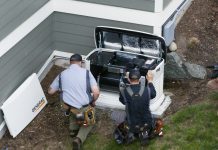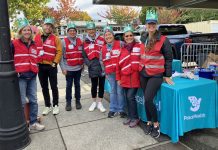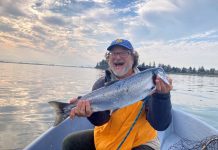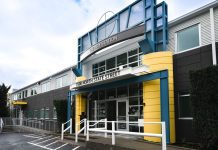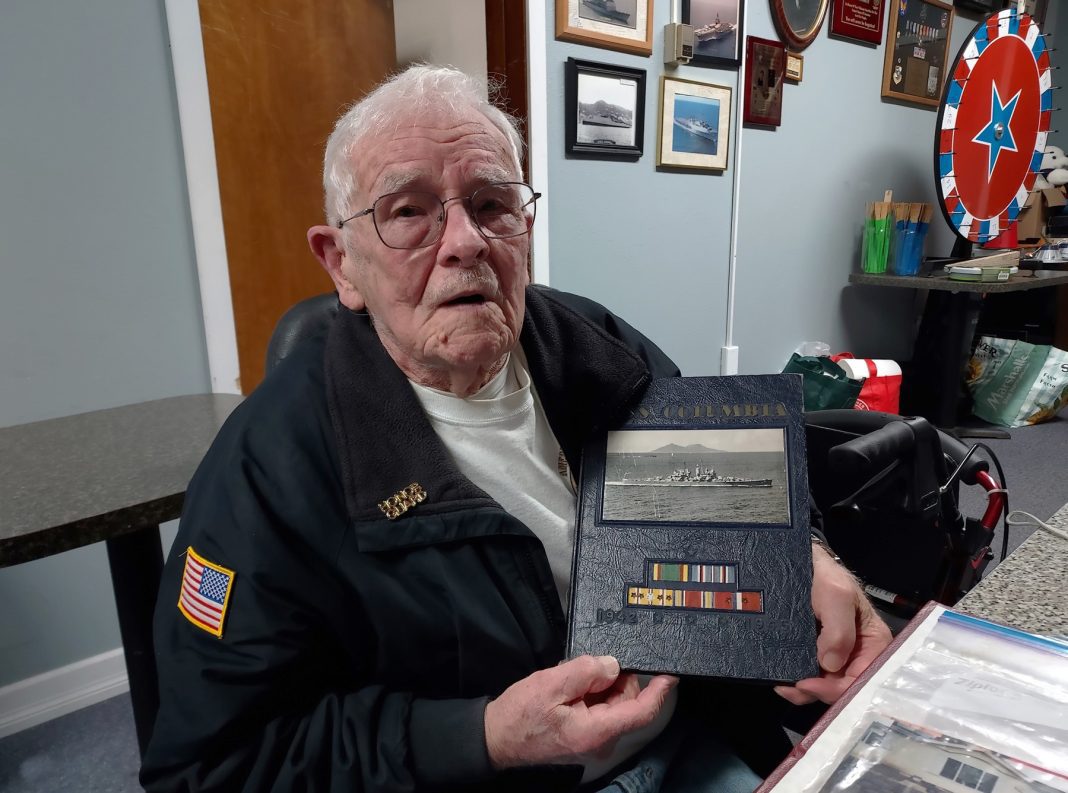When World War II ended in 1945, 16 million Americans became war veterans. Nearly eight decades later, that number continues to dwindle: the U.S. Department of Veterans Affairs estimates that 131 WWII veterans die each day, and as of 2023, only about 119,500 were still with us.
Whatcom County’s Russ Chapman is among them. At 97 years old, Chapman is the last-surviving WWII veteran at Bellingham’s American Legion Albert J. Hamilton Post 7. Though hard of hearing and using a walker, Chapman is in otherwise good health for his age and regularly visits the legion hall to socialize, attend meetings, and even drink some beer.
In February, the legion post threw a birthday party for Chapman, and dozens of people showed up for pie and pictures.
“I think it speaks to the dedication of Russ as an individual, and his generation, that — at 97 — he’s still coming to two meetings a month,” says Robert W. Meyers, the post’s historian. “When he shows up, the room lights up.”

In the Navy
Chapman was born in Bellingham in 1927, at his grandparents’ home on 13th Street. For four years he was an only child, before being joined by two brothers and two sisters.
“I was the lead brat,” he says with a chuckle.
Chapman attended Lowell Elementary School, Fairhaven Middle School, and Bellingham High School. He was 14 when Pearl Harbor was bombed, leading the U.S. into the growing conflict. In early 1944, Chapman first tried to enlist.
“I thought it was the thing to do,” he says of joining the war effort. “All the other people were going.”
Chapman and a friend attempted to join up at the same time, but Chapman failed his physical exam multiple times due to high blood pressure. Meyers says it’s not uncommon for the blood pressure of young men to be elevated during the tension of the enlistment process.
In December 1944, a 17-year-old Chapman finally passed his physical and dropped out of high school to join the U.S. Navy. By January 1945, he was going through boot camp in San Diego, California. After several weeks’ leave, Chapman returned to California’s Camp Pendleton for landing craft training. Shortly after, he found himself at Naval Base San Pedro in Los Angeles, glimpsing the ship he’d soon be aboard: the USS Columbia (CL-56).
Just months’ prior, the Columbia had been the victim of multiple kamikaze attacks that killed a total of 37 men. Now overhauled, Chapman knew he would be seeing combat when he boarded, and would do so as a radar operator.

Dispatched to the Pacific theatre, Columbia provided support for landing troops in Borneo, and was also part of Task Force 95, a convoy of ships that protected American forces stationed at Okinawa. It was here, in the summer of 1945, that Chapman and many other sailors shared the grim conclusion that an attack on the Japanese mainland would be imminent. As a result, many assumed they would not return home alive.
When the atomic bomb was dropped on Hiroshima on August 6, Chapman said it took him and others by surprise — but also with immense relief. Even so, there were still dangers.
“The day they said the war was over, we had an air attack from Japanese aircraft,” Chapman recalls.
With the war officially over, the Columbia headed south, carrying inspection parties to Truk Atoll and its Japanese base there. The vessel visited several other South Pacific islands before heading home through the Panama Canal. It reached Philadelphia in December 1945 to be de-commissioned, and Chapman took a three-month training tour to Quebec City, Canada.
Chapman says he never had a truly close call during the war, but one of his best friends and longtime neighbors did.
Bobby Turner — a gunner’s mate aboard the USS Lexington — was instructed one day to switch positions from the front to the back of the ship. Shortly after, a kamikaze impacted the front of the ship. If not for the position swap, Turner would have almost certainly been killed.

Life After the War
After being discharged from active duty in Bremerton, Washington, in August 1946, Chapman remained in the naval reserves. He served out of Naval Station Puget Sound, located at Seattle’s Sand Point, and worked as a flight engineer for PBY Catalina aircraft.
In 1950, several months before the Korean War began, Chapman was honorably discharged from the military. After serving as a volunteer firefighter in Stevenson, Washington, from 1951 to 1954, Chapman took a job in Whatcom County with Georgia-Pacific. He wound up as a journeyman millwright, and retired in 1988.
His life also produced a wonderful family. Chapman met his wife Della in high school in 1943. They married in 1948 and were together for 66 years, until her death in December 2014. Chapman still drinks a glass of wine on the anniversary of her death. The couple had four sons, but only one is still living. In addition to his remaining son, Chapman has 10 grandchildren, five great-grandchildren, and one great-great-grandson.
Because he dropped out of high school to serve in WWII, Chapman didn’t receive his diploma until he was 42. It was sent to him the same day his first grandchild was born.

In his retirement, Chapman and his wife spent 10 years working for the Washington State Parks Department as campground hosts, spending time at Lake Chelan and Port Townsend’s Fort Warden. Honoring his military service, Chapman was originally a member of the Veterans of Foreign Wars branch in Laurel, and joined the Post 7 American Legion about 23 years ago. As an executive board member, Chapman attends each executive and general membership meeting, while also volunteering on Saturday poker nights.
“I come to all the meetings I can,” Chapman says.
For 11 years, Chapman also served on the legion’s honor guard, providing volunteer military funeral services, up until two years ago. He also used to bowl quite well (his highest score was 298). Though he moves slowly now, he does still move. Occasionally, he says, he even gets to dance a little.
So, is there a secret to his health and longevity?
“Just staying out of trouble,” he says with a smile.
Overall, Russ Chapman knows he has led a good life, and he is proud to have been a part of world history.
“I felt pretty fortunate that I made it through,” he says of the war. “I didn’t think I was going to, but I did.”




